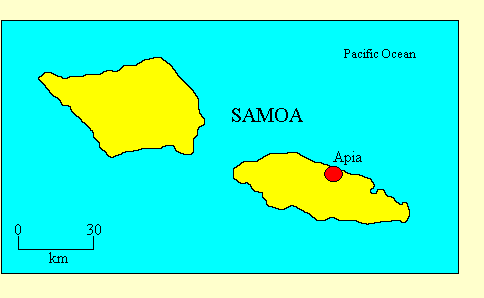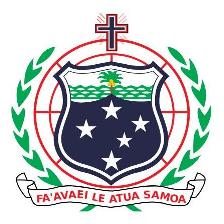
INDEPENDENT STATE
OF SAMOA
Official name: Malo Sa'oloto Tuto'atasi o Samoa (Independent State of Samoa)
•Location: Pacific Ocean
•International organisations: African, Caribbean and Pacific Group of States, Commonwealth of Nations,
Pacific Islands Forum, United Nations
•Borders: None
•Coastline: Pacific Ocean
•Land area: 2,944 Km2
•Population: 180,000
•Annual GDP (PPP) per capita: US$5,400 (2009 CIA estimate). World ranking: 110
•Ethnicity: The Samoans are a Polynesian people. About 10% of the population are of European and mixed race origin.

•Language: Samoan is the official language, but English is the language of business and administration.
•Religion: Most Samoans are Protestant Christians.
•Form of government: Constitutional monarchy and limited parliamentary democracy. Samoa is divided into 11 districts.
•Capital: Apia
•Constitution: The
Constitution of Samoa came into effect on 1 January 1962.
•Head of state: The Head of State (O le Ao o le Maloon). The Head of State is chosen by the legislature from
among Samoa's hereditary chiefs and for a five-year term.
Tufuga Efi took office in June 2007.
•Head of government: The Prime Minister, appointed by the Head of State. The Prime Minister is the leader of the
largest grouping in the legislature and is accountable to it.
•Legislature: Samoa has a unicameral legislature, the Parliament (Fono).
The Parliament has 49 members, of whom 47 are elected for a five-year term from traditional village-based electoral
districts of unequal population, and two are
elected to represent voters (mainly non ethnic Samoans) who have no traditional village affiliation. A map of the
electoral districts can be seen here. Only
members of the chiefly class (the Matai), about a quarter of the population, are eligible for election to the
Parliament. A country in which three-quarters of the population is disqualified from elected office cannot be
considered a democracy.
•Electoral authority: The Office of the Electoral Commission
conducts elections.
•Freedom House 2009 rating: Political Rights 2, Civil Liberties 2

Political history
The Samoan Islands, at that time a Polynesian kingdom, were discovered by the Dutch explorer Jacob Roggeveen in 1722. In the 19th century Britain,
the United States and Germany all developed interests in the islands, and in 1889 the three powers agreed to
place the royal Samoan government under British, American and German supervision. Britain relinquished its interest
in Samoa in 1900, and Germany and the United States then partitioned the islands, the eastern half becoming
American Samoa. In 1914 German Samoa was occupied by
New Zealand forces, and in 1920 became the League of Nations mandated territory of Western Samoa, administered by
New Zealand. In 1946 it became a UN Trust Territory, with full independence achieved in January 1962.
Western Samoa gained its first Legislative Council in 1920, and in 1948 the Parliament was made fully
elective, although among the Samoan population only members of the Matai or chiefly class could vote. Non-Samoan voters elected members from a
separate roll. The two senior Chiefs were made co-Heads of State for life, but one of them died in 1963 and
the other, Tanumafili II Maleota was sole Head of State until his death in 2007. Universal franchise was granted
in 1990, but the restriction of candidacy for the Parliament to the Matai has kept power in the hands of the
chiefly class. In 1997 Western Samoa changed its name to Samoa.
At the 2006 election the Human Rights Protection Party won a majority of seats in the legislature, and
maintained its
majority in 2011. The main opposition party is the Tautua Samoa party. The
HRPP's Tuilaepa Aiono Sailele Malielegaoi has been
Prime Minister since November 1998.
Freedom House's 2009
report on Samoa
says: "Samoa is an electoral democracy.* The 2006 legislative elections were deemed free and fair... Official corruption and abuses do not appear as widespread or serious as in some other states in the
region. Samoa was ranked 62 out of 180 countries surveyed in Transparency International's 2008 Corruption
Perceptions Index... Freedoms of speech and the press are generally respected... Freedoms of assembly and association
are respected in practice, and human rights groups operate freely... The judiciary is independent and upholds the
right to a fair trial."
* As noted above, I don't accept this view.
Updated March 2011
|

